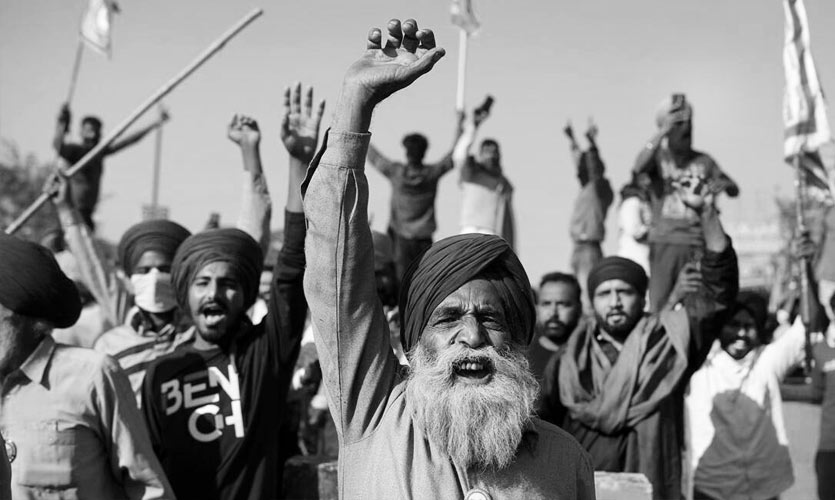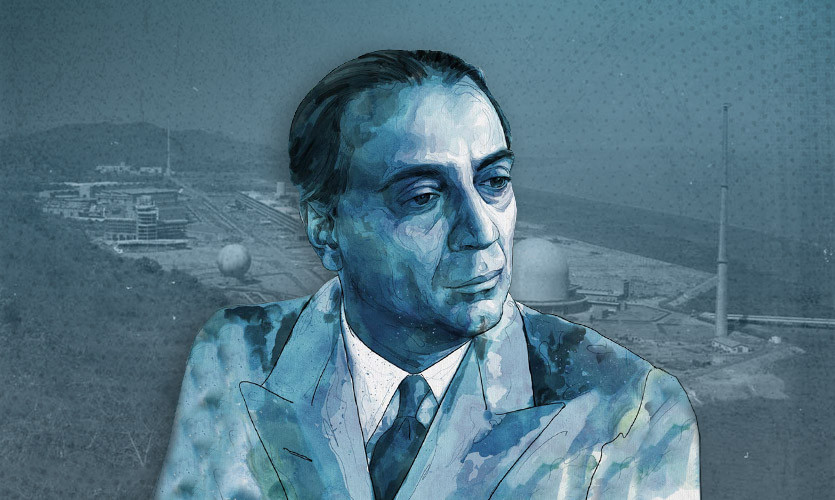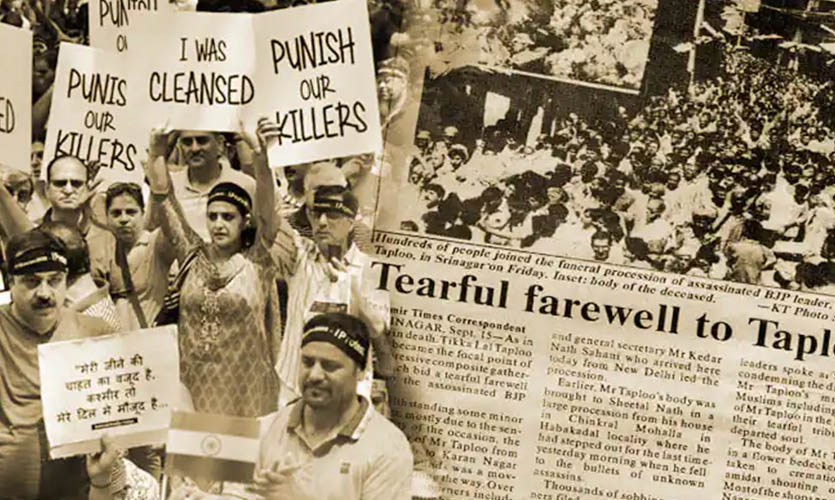Ten months on, the farmers’ protest continues to stay strong, with a successful Bharat Bandh organised just this week.
The right to dissent is a default right offered by our constitution. The protest led by the supposed farmer leaders in Punjab, Haryana and Delhi’s border regions forms the single biggest nagging thorn in the Bharatiya Janata Party’s (BJP’s) side. But is the protest rational?
The farm laws, or as more popularly described, the three “contentious” farm laws were cleared by the Rajya Sabha on September 20, 2020. Ever since, the events that ensued – specifically, the farmers’ protest – has managed to garner the headlines almost every single day. Last week, September 22 marked 300 days of the protest in northern India. If the recent Bharat Bandh was any indication, the farmer leaders seem to be in it for the long haul. However, despite the protest, there seems to be little negative commentary in opposition to the farm laws. Even if one presents the argument of biased media, there does not appear to be substantial academic evidence against any drawbacks that the laws may have either.
APMC-MSP Fears
The three ordinances: the Farmers’ Produce Trade and Commerce (Promotion and Facilitation) Ordinance, 2020, the Farmers (Empowerment and Protection) Agreement on Price Assurance and Farm Services Ordinance, 2020, and the Essential Commodities (Amendment) Ordinance, 2020, aim to institute a free market and increase buyers for the farmers, making markets more accessible, and allowing stock limits only in times of extraordinary circumstances such as war and famine. Their objective is also to overcome the drawbacks of the current Agriculture Produce Marketing Committee (APMC) mandi system, which, as the Standing Committee on Agriculture (2018-19) has observed, has led to cartelisation and undue deductions in the form of commissions. The committee’s report also notes that the licensing requirements have led to a monopoly of the licensed traders and that the current system needs to be reformed “urgently”. Prakash Thakor, a wheat and groundnuts farmer in the Khimana village of Banaskantha, Gujarat, says, “The mandi intermediaries give us an even lower price than the MSP (minimum support price) set by the government. We don’t have a choice but to agree to their prices. If there is a profit, it certainly does not reach us.” The proposed laws would abolish market fees, reducing the power that intermediaries hold over farmers. They would also prohibit the state governments from levying any kind of fee or cess on any stakeholder regarding trade conducted in an “outside trade area”.
The farmers’ agitation in northern India circles around their main demand of retaining the current APMC-MSP system. MSP is the minimum amount decided as remuneration for the farmers’ produce by the government, thereby guaranteeing support. Government agencies procure the produce at MSP; however, this is often limited to wheat and rice, which is why the farmers of Punjab and Haryana have been the most restless. Although MSP has never been a legal provision, the misgivings appear to be building up for a while. While the laws seem to have pushed the farmers over the ledge of distress, one can’t help but wonder whether there is any merit to the reactions. “The farmers are afraid that once the bigger corporates get involved, the prices will fluctuate and they will be exploited,” says Advocate Krishnanand Mishra. He continues, “Even though MSP is not a part of the law currently, the distrust among farmers has been building up for so long that they feel the government is trying to do away with the MSP system… which is absolutely not true.”
On fears that the proposed laws will do away with the current APMC mandi system and thus, harm the farmers’ current trade prospects, Mishra says, “It is not a go-around from the APMC system. The belief is entirely false. Apart from the laws, the Centre has also repeatedly said that the APMC-MSP system will not be abandoned.”
Mishra explains the possible reasons behind the fears that have continued to trouble the farmers: “Most farmers are simple people with limited access to education. Despite clear laws, their biggest fear is that they will be exploited by the corporates. Moreover, they are being fed with the same narrative by the mandi intermediaries as well. The farmers have been told that they will be given higher prices initially and once the mandi system goes, they will be exploited… and since the farmers have been working with those people for so long, they trust them more.”
Small and marginal farmers tend to have larger concerns. As Scroll.in reports, “The lack of land reforms and unassured markets were some of the major reasons for farm distress in India.” The sudden changes have made the farmers apprehensive that the implementation of these laws could give way to land-grabbing. “The farmers are afraid that it is a land-grabbing technique. But there is nothing ambiguous about the laws. It is like any other contract, according to which, if either party fails to fulfil the terms they will be penalised. But as per the proposed laws, no one can touch their lands,” explains Mishra. The Farmers (Empowerment and Protection) Agreement includes a provision for dispute settlement, which guarantees that “no action can be taken against the agricultural land of farmer for recovery of any dues”.
Panel Report Delay
When the implementation of the three laws was suspended in January this year, the Supreme Court constituted a committee to analyse the laws and their repercussions. While the report was evidently submitted about six months ago, its findings have not yet been released by the Court. “There is no reason apparent behind the Supreme Court delaying the release of the report. It is quite surprising,” says Advocate Mishra.
Anil J. Ghanwat, president of the Shetkari Sanghatana who was nominated as the representative of the farmers to the panel has said that their report is in the favour of the farmers and the country. “The report has addressed all apprehensions of the farmers. The committee was confident that the recommendations will pave the way to resolve the ongoing farmers’ agitation,” he said. Ghanwat said that while the report does not support the repealing of the laws, it does highlight the “defects” that need to be addressed. The main issue highlighted by the report is also the MSP.
“The farmers want MSP to be made into an act to legalise it because they are afraid that the Centre will go back on its word. But it is not easy to make something a part of the constitution like that and is also time consuming,” says Mishra. He further commented, “It might also not be something that the government may want to focus on as of now.”
Why The Fuss?
The privatisation of the sugarcane industry in Bihar has been brought up by most supporters of the protest. However, these are both different situations. “Bihar only deregulated the market instead of reforming,” says Sukhpal Singh, professor and former chairperson, Centre for Management in Agriculture at the Indian Institute of Management, Ahmedabad.
Advocate Mishra cites the political angle. He supposes, “There is always going to be a political agenda behind passing or protesting any law. The mandi system is a big source of side income for the opposition in the Centre and the current government in the state of Punjab. Once these laws come into effect, that arrangement will be seriously impacted.”
The farmers’ fears over MSP and land-grabbing have also fuelled the agitations. Moreover, the delay in the release of the panel report hasn’t helped. “We can say that the judiciary is independent, but there is always some sort of pressure by the ruling government, and that is not hidden,” says Mishra. The possibility of the Centre putting pressure on the Supreme Court to not release the report until the election season cannot be denied.
Indian farmers have been the supreme providers of the country, who deserve to be held in high regard. It is true that historically, they have not been treated with the utmost kindness. But crying wolf and falling for the words of those who have been in charge of writing much of that history, has only proven counterproductive. Nevertheless, just as they need to be open to dialogue, it is the government’s responsibility to educate them, ensure transparency, and help them overcome their misgivings.
The Horus Eye is a weekly column written by Divya Bhan analysing current affairs and policies. This column does not intend or aim to promote any ideology and does not reflect the official position of The Sparrow.
Also read: Is The BJP’s Stand On Appeasement Politics Hypocritical?










